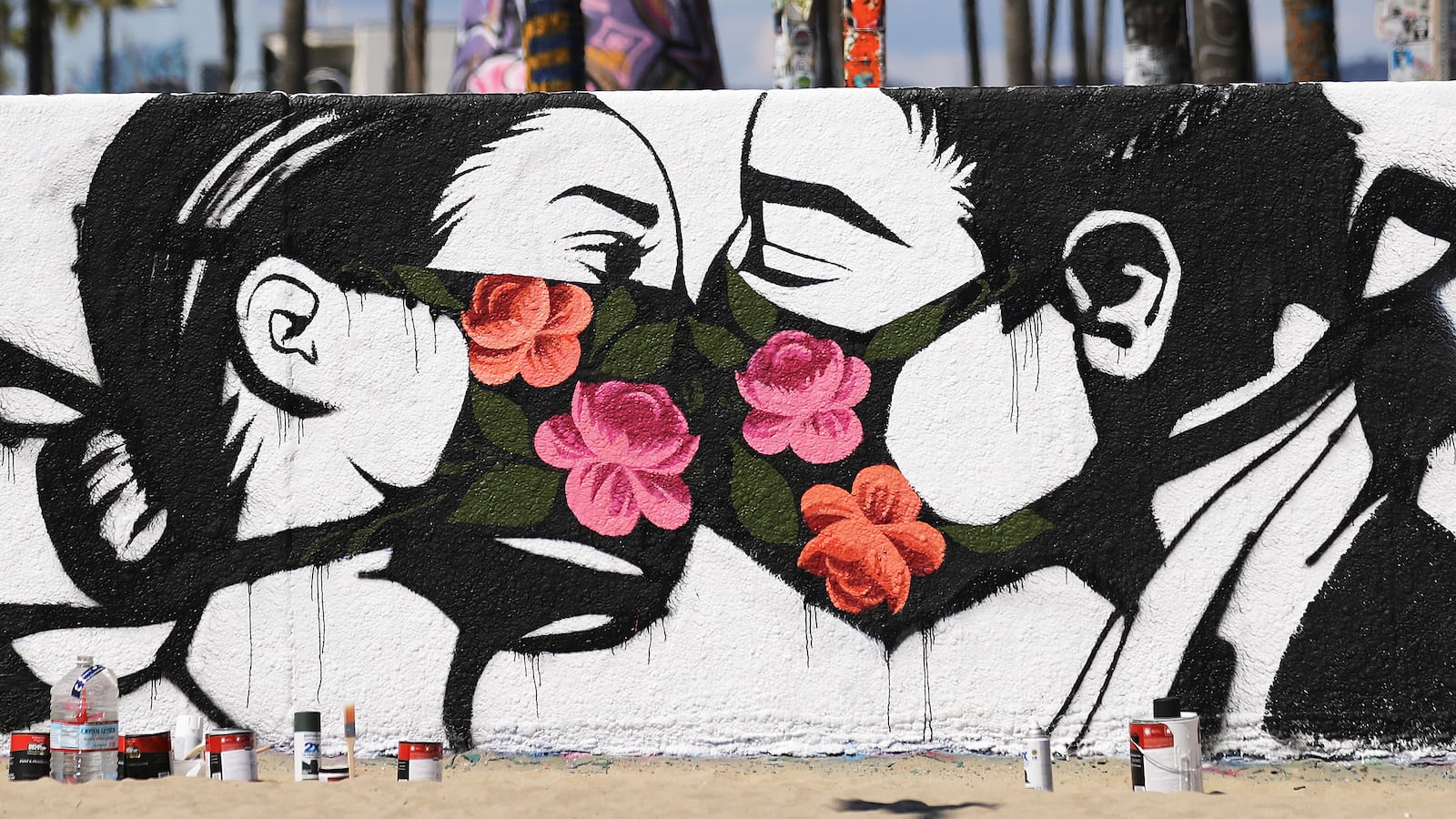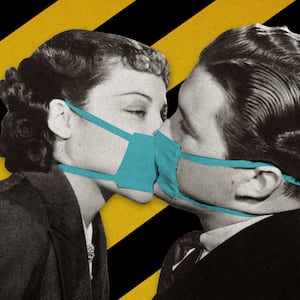For the past two months, Katie Holliday has been cooped up alone in her Brooklyn apartment thinking longingly about an unlikely erogenous zone: the lower half of a stranger’s face.
“I remember joking to my friend before all of this started, ‘Imagine if someone’s face becomes their most coveted body part?’” Holliday, who is 31, told The Daily Beast. “‘When someone removes their mask, is it a sign of trust? Is it like letting someone see you naked?’ I was kidding back then, but now it’s reality.”
Holliday doesn’t know exactly when it will be safe to start seeing people like she did before the pandemic began, but she’ll return to a singles scene unlike any other in history. “I’m picturing walking into a bar where everyone’s wearing masks,” she said. “I’ll meet someone whose face is covered. Are they cute or not? I don’t know!”
Depending on the op-ed you read, it might seem as if all this death anxiety could lead us into a new sexual revolution. People are taking part in virtual orgies, stocking up on vibrators as if its a non-perishable food, and moving in with their partner after a week of dating to have tons of sex with their quarantine bae.
But according to Dr. Justin Lehmiller, a research fellow at the Kinsey Institute and author of the book Tell Me What You Want, “Reports of a sex boom are exaggerated.” Since March, Dr. Lehmiller and his team have led a study into the intimate lives of people during lockdowns, using a sample of 1,559 adults aged 18-81.
Nearly half of them—43.5 percent, to be exact—reported that “their sex life has declined and that they are less sexually active now.” (That statistic represents the entire group and consists of both singles and couples. Specifically, 65 percent of those living alone reported a decline in sex compared to 33 percent isolating with partners.)
“On average, sexual frequency and also frequency of masturbation has decreased compared to what people do during typical times,” Dr. Lehmiller added. “It could be that some people are in this bubble where everyone’s super horny and masturbating all the time, but that’s not representative of the broader population. These anecdotal reports [of horniness] just don’t add up when we look at the data.”
Don’t tell that to sex toy retailer Linnea Marie, who reports she’s selling her products at “double” the rate she used to. “Everything happened in early March,” she said. “I think quarantine has challenged people to open up more. Couples are together all the time, saying OK, we’ve had enough sex, let me try a masturbator on you.’”
The most popular are toys that can be enjoyed by two people. “Some women have emailed me saying that they need a break [from sex with their male partners],” Marie said. She recommends those customers buy the Tenga Egg, which is a masturbation stimulator for penises. “If [women] want a break, they can use it on him.”
Jennifer Litner is a sexologist and founder of the Chicago-based practice Embrace Sexual Wellness. She’s not involved in the Kinsey study, but noted that many clients are “experiencing changes to their desire.”
“The idea that everyone is horny all the time, that this is a sex vacation, a lot of people are embracing that,” Litner said. “But a lot of people are also feeling anxiety and a lack of energy, which we know has strong ties to sexual desire. So I’ve noticed that people are not necessarily more or less [horny], they’re just finding that things are different than usual.”
Dr. Lehmiller noted that when couples are having sex, they might be trying new things. “They’re sharing and acting on sexual fantasies, having sex in different locations of their homes,” he said. “People have an inherent need for novelty when it comes to sex, especially during this unusual time we’re in. All of that is going to shape the trajectory of our sex lives and relationships going forward.”
At the Institute for Family and Sexuality Studies at KU Leuven, a team of researchers are eager to see how much sex couples are having in quarantine. They have set up a daily diary study, where both halves of a couple are asked to answer questions about their habits six times a day for ten days.
Professor Erick Janssen, Ph.D, told The Daily Beast it is too early in the process to report back any findings. “We want to see how all those experiences of stress impact people’s sexual desire,” Janssen said. “There’s a lot of variation of how people have sex.”
Lizzie Chadbourne, a 24 year-old graduate student who studies sexual reproductive health, left New York in March to quarantine with her family in California. She plans to reunite with her boyfriend in Brooklyn later this month. During their time apart, they’ve let their imaginations run wild on FaceTime. “It can be easier to be more open about the things you’re into or want to try when you’re using words rather than if you’re [face-to-face],” Chadbourne said.
When they finally get to see each other, they’ll put that creativity to use. “The current virtual-ness of my relationship will impact my non-virtual relationship in the future,” Chadbourne said. “For example, we’ve never had sex in my kitchen. I can imagine that because we sext about doing that, it will actually happen when we’re together. Also because we’re going to be quarantined and not able to leave our house for a while.”
Those who entered quarantine on their own are less certain of the next time they’ll have sex, or even a hug.
Save for the companionship of her Dachshund mix Cocopuff, Serena has been “completely alone” since Feb. 20. Isolation is a must for the 56-year-old, who asked to keep her last name private, as she suffers from rheumatoid arthritis and fibromyalgia. This makes her a high-risk, immunocompromised patient.
Even without a national crisis, Serena is used to the confines of her one-bedroom apartment in Louisville, Kentucky. Her chronic illnesses often leave her too tired to do much of anything. But the divorcée, who has two adult children, still hopes for the day she can date again.
“I’m not going to feel safe going back to normal until there’s a better treatment for people with COVID or a vaccine,” Serena told The Daily Beast. “But just because my body is sick doesn’t mean I don’t crave human touch and want to be involved in things.”
She doesn’t know exactly when her first date after the pandemic will happen, or who it will be with. Will she wear a mask? “I think if I’m around someone who’s not exhibiting symptoms, and there’s a space between us like a table, then no,” she said. “I think that’s OK.”
And what if the date goes well? “I don’t know where someone’s been,” Serena said. “Is there something I need to know about their health? I think if you’re going to be responsible and dating, then you need to have a conversation about coronavirus with them. It’s not like COVID is the only thing you can get from sex.”
But safer sex conversations usually happen right before clothes come off; coronavirus can be spread through a chaste hug or quick kiss. “How do we even flirt if we can’t take off our face masks at the bar?” Holliday, the New Yorker isolating alone, asked. She’s not necessarily looking for a long-term partner right now, but she wonders how safe it will be to hook up in the wake of a plague.
“You can’t just casually have sex with anyone, you have to be more responsible,” Holliday said. “You’re going to have to ask: Who else are you kissing? Are we in the same kissing circle?”
Emma, a 32 year-old Brooklynite, identifies as polyamorous and entered quarantine dating one person and a couple. (She asked to keep her last name private.) The couple chose to social distance separately from Emma, and she doesn’t know when they will reunite.
“One thing that comes up a lot [in polyamorous relationships] is hierarchy,” Emma said. This refers to how some choose to rank their partners. Someone’s “primary” is who they are the most close to and a “secondary” holds less influence.
“I have a lot of friends whose partners just went upstate or across the country [to get out of New York], and didn’t tell them about it,” Emma said. “A lot of my friends are hurting because of those decisions. It seems like a lot of people are finding out that they’re in a hierarchy and they’re not at the top. That wasn't apparent to them before the pandemic.”
One of Emma’s friends has been in a polyamorous relationship with a married man for over a year; he left New York with his wife without telling her. “She understood [at first] because they’ve been married for a long time, but he brought his other partner who he’s been seeing for a year. My friend is like, I didn’t know I was one rung down from this other person.”
Because of this, Emma believes that “the non-monogamous community is going to have to collectively reckon with how it deals with hierarchy and how people were treated during this time.”
Indeed, dating fatigue has hit most demographics as the shutdown drags on. Mekishana Pierre, an entertainment writer and former colleague of this author, endured a three week-long bout with coronavirus that left her “out of it.” Now recovered, Pierre’s back on dating apps, though she has no interest in meeting up with anyone.
“People say, ‘Let’s hang out at my place instead of the bar,’” Pierre said. “That’s not a safer alternative for me. As someone who’s dealt with this, I definitely don’t want to see any of you.”
Trickier still will be bringing someone home to an apartment shared with others. Holliday said that her friend who has roommates had to set ground rules about restricting visitors during lockdown.
One roommate refuses to listen. “He continuously brings his partner in and out, and she’s been coughing, the other roommates are freaking out. He doesn’t seem to give a shit at all.”
But when it comes to her own relationships, Holliday says that her “priorities have changed.” She thinks she will cry when she sees her friends for the first time after isolation, and she'd rather spend time with them than any man.
“There’s so much organizing to do right now—community needs, mutual aid, rent strike,” she said. “Duh, I’d love to fuck, but it’s not even on my radar. Well I say that now, but once the bars reopen and I’m six beers in with my cute mask on, who knows what will happen?”






